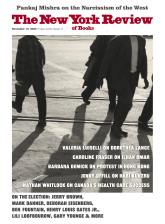The day after that day, four years ago, was funereal. Most people I spoke to said it was like a funeral, and it was like a funeral too to other people they had spoken to. And so the word “funeral” became commonplace. It was the word for the day, to the extent that, later, it became a synecdoche for that day and the day before it as well. The synecdoche soon wore down, however, and other words came into view. Some of us said that ever since that day, the day after, we have been living in a long grief or mourning or illness or death. “We have been living in a long death,” I heard once from a swimming instructor; I told her she sounded like a poet. She said she had never written a poem in her life but that she loved reading poetry, and I was moved each time I recalled her phrase. I would repeat it sometimes to myself, replacing “death” with “grief” or “illness” or even returning to the original marker, “funeral.”
The search for language comforted me. But it was still early days, and soon I began to hear a cynicism that hadn’t been there before. Mocking and self-mocking, the violation of the funeral became a settled thing. It was now ordinary, and as with the ordinary, and as with evil, its absurdity was something that could be laughed at. I noted this to a friend. He explained it was “the American way” of coping with the exhaustion from it all. His explanation helped, and I began to understand that living in a long funeral was relentlessly linked to a resignation that must be fought day by day. It wasn’t only “the American way.” That day reduced the globe to an elegiac mode.
I returned to that day, the day after that day, in my mind. Granular gray. Strangely scant of people. At midmorning I walked to my office on the campus where I taught. I had canceled my classes for the day. The previous week, when we still risked innocence, I had told my students I would be in my office the day after that day, today, and if they liked to they could come see me. It seemed many of my colleagues did the same: pockets of students shuffled in and out of offices in my building. On my walk there, I had Robert Hayden’s “A Plague of Starlings” in my head. The frigid atmosphere, the campus lawn littered with election posters must’ve triggered it—the poem is set, as the subtitle informs us, on the campus of Fisk University, in Nashville—and I was filled with the weight and peculiar grace of that poem when my students stopped by my office.
The first to come was already in tears. He stood at the open door and wept; he wept when he said hello to me, and I wept back. The second came, her face set in shock the whole time we spoke; she wept only as she was about to leave. The third and last were a group of four students. When their chatter filled my office, I felt a sudden fright deep inside of me; I fought it as I spoke with them, and then almost as suddenly I felt a joy mingling with the fright. I was confused as to where to place either. The students stayed long in my office and eventually left when the afternoon began to darken.
I walked home, the campus now utterly deserted. I played over in my head the words of elemental loss I’d heard from my students. I was overwhelmed and walked in a blind, inner haze across the lawn. Not until I was almost face to face with an elderly woman did I return to myself. It took a moment for me to realize she was speaking. “It will be all right,” she was saying. It will be all right. It will be all right. I remember echoing her words back to her and saying, “Thank you.”
Now, with only a little time left until another election day will come again, I’ve been thinking about that brief encounter. The woman appeared suddenly on the campus lawn with the consoling simplicity of a starling, and with the dark falling fast she spoke words that quieted my distress. The days grew into weeks and months into years. Over that time, the raw hurt of the country wore her words down in me into other words that eventually wore into a silence I was powerless against. Even so, a rage edged the silence, eclipsing all, like love.
Belated and transient as love, her presence has helped me to keep faith in what her words meant, their promise. I’m thinking of her presence more as we near the day again. What crisis will befall us the day after that day? Come what may, I hope we will be better prepared for the future, so that we can assent to something Simone Weil wrote in her notebook at the outbreak of World War II: “You could not be born at a better period than the present, when we have lost everything.”
Advertisement



